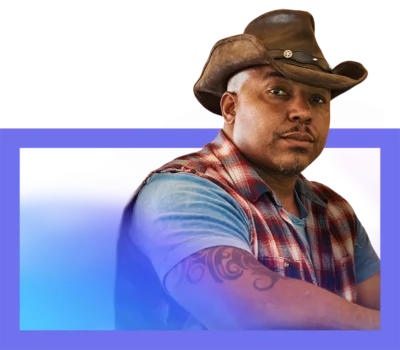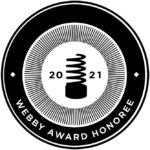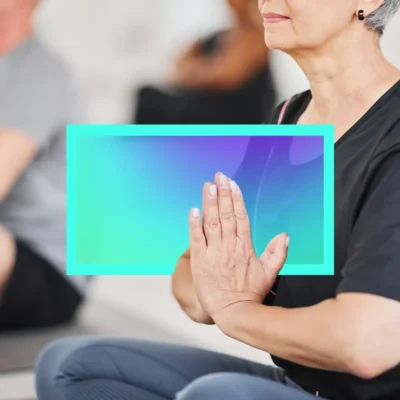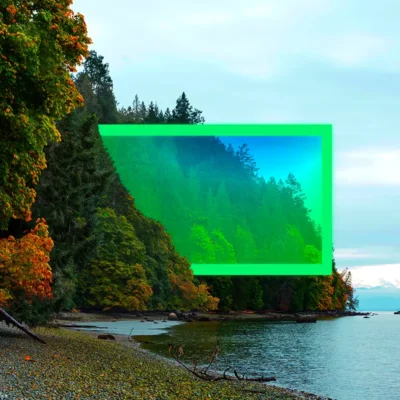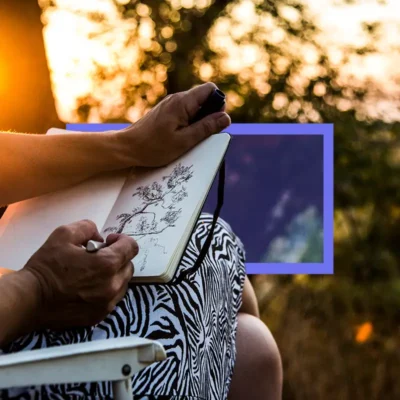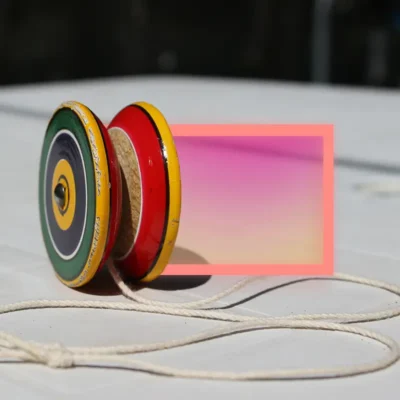Discovering the path to honor
Ghuan Featherstone is determined to go his own way – to live with courage, kindness, and faith in justice. To be a cowboy. But growing up in a neighborhood rife with gang violence, the forces marshaled against him feel beyond his control. After visiting a little-known horse stable in South Central LA, Ghuan discovers a path to honor on the back of a horse, casting the most iconic American hero in his own image, and embracing the Cowboy Code he swore by as a boy.
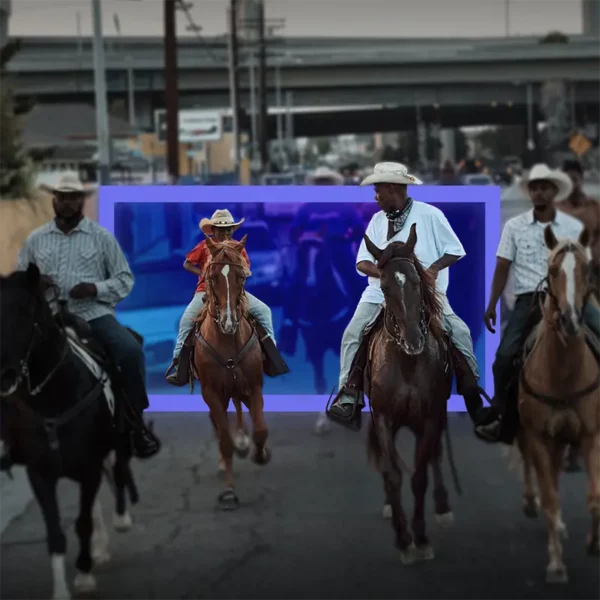
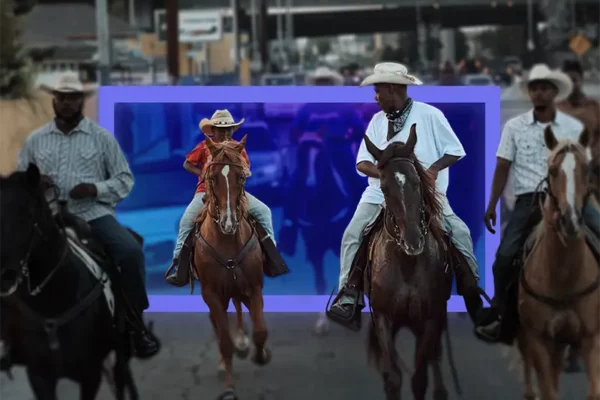
Table of Contents:
Transcript:
Discovering the path to honor
GHUAN FEATHERSTONE: Gradually I find I can relate to people a little bit more. I start to open up.
Every week I see new faces on The Hill – folks we see out in the hood when we’re riding around coming up to have a look. It’s like we’re building a real community up here. It fills me with a sense of purpose.
Eventually, my longing to be elsewhere lifts. Now, I just long to be here on The Hill with these horses.
ROHAN GUNATILLAKE: In today’s episode, we’re back exploring cowboy culture but through a fresh lens, reimagining a quintessential American icon.
Born and raised in South Central, Los Angeles, a neighborhood rife with gang violence and drugs, Ghuan Featherstone was determined to go his own way. Inspired by the cowboys he watched on TV as a boy, he lives his life by a code: showing courage and kindness. Ghuan’s life was transformed by learning to ride horses at a small stable hidden deep in South Central. Today, as the founder of Urban Saddles, he shares his passion for horsemanship with his community, living the Cowboy Code.
In this series, we combine immersive first-person stories and breathtaking music with the science-backed benefits of mindfulness practice. From WaitWhat and Thrive Global, this is Meditative Story. I’m Rohan, and I’ll be your guide.
The body relaxed. The body breathing. Your senses open. Your mind open. Meeting the world.
FEATHERSTONE: We live in a one bedroom unit. My mother, step-father and my baby sister sleep in the bedroom. I sleep on the living room couch. The paint job on the walls is poor – uneven, peeling. I know it’s time to get up when the sun hits my eyes through the threadbare curtains on the windows.
We have one of them old wooden TVs, with the big oval screen. Doesn’t work too good, but I know how to get a picture. First I just fidget with the antenna – an old crooked hanger – until the TV picks up a signal. For a while there’s just static, distorted images. Gradually the picture shifts, and it comes into focus.
My friends are into superheroes, like Superman or Batman. For me it’s The Lone Ranger. That’s my number one joint. Every Saturday I watch him go up against all odds, fight 100 bad guys, save the day, and get up out of there. I always worry he’s not going to make it though. But he always does.
I stand in front of the TV and I pretend I’m a gunslinger. I know the moves. I know all the lines. I work hard just to get that holster pull just right.
What I love most of the Lone Ranger is he has a code: All men are created equal. We all got it in us, to fight for what’s right. That’s cowboy.
As I watch the TV I wear my jean jacket, it’s a tan cowboy suit with tassels – and I got cowboy boots and a toy pistol, too. I’d wear the suit every day, but mom won’t let me. “You got to take it off, boy, you got to take it off.”
Yeah, I’m a different type of kid. The other kids, they laugh.
“Ain’t no horses up here in the hood,” they say. “Ain’t no black cowboys.”
“There is now. There is now.”
We live in Inglewood, California. I’m five years old. It’s a tough neighborhood. The key to our apartment hangs on a string around my neck, so I don’t lose it. Folks on our block call me the latchkey kid.
I walk around thinking about the cowboys on TV. Eyes open, back up. On the lookout for all the bad guys.
My little posse is four other kids from our apartment building, including a girl named Elaina, who I really like. One day we’re coming home from school and this man gets behind us, acting like he knows us. We know something ain’t right though, and we all start running and we don’t look back. Elaina never makes it home.
They find the guy later, but it’s too dangerous for us. And so mom sends me to Pennsylvania to live with my grandmother and grandfather, a pastor. I have nightmares about this. I dream I’m a cowboy, trying to save the day. But I’m too small.
When I return to LA two years later, mom is with this guy, David. Something’s wrong with him. He yells and throws things around. Sometimes I find him passed out on the couch, in a chair. I cry myself to sleep at night, worrying about mom in there with him.
One night mom wakes me up. The house is dark. She whispers, “Are you ready to go with mommy? We going to leave daddy now.” Yeah, I’m ready. I’m like, “You mean now now?” And we got up out of there.
Mom and I move into a place right in the middle of the Harlem Crips hood, in South Central, Los Angeles. From a bad Compton hood to worse. Gangs everywhere. 18th Street, Rollin 20s, Brims, Black P. Stones, Black Guerrilla Families.
Pretty soon I get into trouble with a few older guys. I’m a little dude, 8 years old. One Sunday they take me out to a school, put me in through a window to open the door for ‘em. They grab computers, projectors. I grab what I like – pens and markers spill out of my pockets. This is my first time doing this. The police come. The older guys – they make a run for it, and the cops – they catch me.
I don’t tell anybody a name or anything like that. I know the rules: snitches get stitches. One of the cops calls mom and tells her what happened. My mother and my stepfather come pick me up and I get one of the worst beatings I’ve had in my life. Tells me I’m heading one of two places: To prison or the grave.
I tell myself. “Ghuan, you got to a choice to make.” I have to pick a side. I pick being a cowboy. And I never engage in any gang activities – or anything like that – again.
But it’s not like you just get to say “no thanks”, I don’t want to be in a gang. You have no idea how many fights I get into just to stay me. To say, “no, you’re not going to jump me into this gang.” I do my exercise, push-ups in my room. And my friends, even they be like, “You better leave him alone. Just because he’s not out banging doesn’t mean he’s not with the business.”
But I know there’s another way – the cowboy way. I want to be the one to come clean up the town. But I can’t do that here. I can’t do it now. I know this from my Westerns: the heroes, they go away. They change. Then they come back for the bad guys.
GUNATILLAKE: Sometimes when faced with the difficult, the best thing to do is to step away. Taking a breath. Giving ourselves the permission to reset. Taking the time to build the qualities of our hearts. Then coming back. Take the time to center, then come back.
FEATHERSTONE: When I turn 18, I join the Army. See the world. Be all that I can be.
My bunkie in basic training is the grandson of a Grand Wizard in the KKK. He’s so proud of that – always talking about the white pride. We’re constantly at it. He has a lot to say, I have a lot to say. We clash so tough the Drill Sergeant makes us a pair – makes us exercise together, go to the range together, everything. Puts me in the bed right on top of his. “Y’all going to be in the foxhole together. Y’all going to be together all the time.”
We finish basic together, then we finish AIT, where we learn our military occupation specialty. And by the time we hit our first duty station, we’re thick as thieves. Like the Lone Ranger and Tonto.
The way my bunkie is raised, all of that hate is put in him. The same people that feed him, clothe him, give him everything he needs, also tell him, “You gotta hate all these black people.” It’s like how the gangs do us in Compton and South Central. All them white cops circling my block in their aviators, making me feel like a criminal all the time. I’ve internalized my environment, too. And I’m angry. Always ready to fight.
But in the army, dealing with my bunkie, I realize everything I’ve learned can be unlearned. That if I don’t allow myself to see with a wider lens I’ll be pulled in against my will into the world around me. I expand my sense of what’s possible.
I come back to LA for two weeks to see mom. It’s been a minute since I’ve been home – 10 years in fact.
I do a lot of living in that time. I have two kids that live in Berlin with their mother – she and I are no longer a thing, but I miss my kids terribly. I go all over Europe after leaving the service. I find work singing with a gospel choir – the Golden Gospel Pearls – and make a decent living. Make friends with people of all different nationalities: German, Albanian, Turkish, Kurdish, Russian, Italian and so on – people that don’t look like me, but who treat me with dignity.
It ain’t easy being Black anywhere, but it’s better than I remember back home. LA has its own rules – how you deal and interact with people. You got the gangs. You got racism. Cops. Some of my old friends are dead. Others in jail. And those who aren’t, they strung out. I don’t want to be around anybody here, and I miss Berlin.
Then somebody rear-ends me in mom’s car, so I prolong my ticket to get all that handled. Weeks turn into months. I pick up some work in construction. I feel stuck. I fall into depression.
One day, I run into my old high school sweetheart. We start spending time together. I open up to her about how I’m feeling – what my childhood was like, my passion for cowboys and the code. About my time in the service, my hope to do good. I tell her I feel a bit lost, like I can’t see what comes next for me.
And that’s when she tells me about The Hill, stables in the middle of LA where Black and latino cowboys ride horses and learn rodeo. Some of her own family go riding at the stables. “They’re cowboys!” she tells me.
I say, “Nah, can’t be no horses up here in South LA.”
I drive down the main street in search of The Hill to see for myself. All I see is an industrial area. But after I turn on 131st St., the city blocks open up into fields.
The Hill sits on maybe three acres of land. Palm trees standing in sand and peat gravel, surrounded by warehouses, stables on either side of an alley running through the center of the property. And sure enough, dozens of horses. And a bunch of black folk riding them.
How do I not know about this place? I feel like a little kid again, waking up on the set of my favorite TV show.
At the far end of the stables, there’s a makeshift saloon, decked out like in the old Westerns. I see a bunch of folks chilling, playing cards, the dominoes. Down the way an old man cooks out of a makeshift shed. He goes by the name of Chicken Wing, and makes some of the best chicken wings ever. Popeye’s who? Nah, you don’t want to go to no Popeye after messing with Chicken Wing.
A few guys come up to greet me. They’re Black, dressed like cowboys. I see Ray, who wears the classic bad guy vest, black with tassles and silver buttons. I’m like, “You ride these horses? How does it work?” They style up a horse that’s nice and tame and help me on. She’s jet-black with a long mane and tail that almost drags the ground. She isn’t really big, kinda skinny, but mild and beautiful. Her name is Ashanti. I don’t know what I’m doing, but the fellas, they tell me how to hold the reins, how to turn this way and that. I’m a cowboy.
I start coming down to The Hill every day, clean Ashanti like they showed me. I take her out to a fenced in enclosure on the grounds, where I ride in circles, I build up my confidence.
But this morning the stable hand tells me, “Oh no, we got another horse for you today. Don’t worry.”
As soon as I throw my leg on, the horse bucks and I hold on. Then she throws me to the ground. I hear their laughter all around me.
“I guess that’s it for you, huh cowboy?” and I’m like “Uh uh, nah, hold the reins.” I hop back on. She throws me off again. Off, on. Off, on. Now she’s up on her hind legs, but I hold tight. I act as if I got no fear. I shush her, pat her on her neck, and eventually she calms down. I lean forward and whisper in her ears, “Okay girl, are we ready now?”
I feel her relax beneath me. All her tension evaporates. Mine, too. She and I, we connect. We communicate. This experience changes my life forever.
GUNATILLAKE: Shoulders relaxed. Hands soft. Legs relaxed. Horse, Ghuan connected. Breathing. Rhythmic movement. Connected.
See how Ghuan’s calm helps his horse be calm. How we are on the inside can really affect those around us. That’s why cultivating calm and steadiness is one of the most generous things we can do.
FEATHERSTONE: Now that I’m more confident, I join a little posse for a ride out into the neighborhood. A center island made of grass divides the street we ride down, which is better for the horses than the pavement. Traffic passes on either side of us, cars honking, kids cheering out the windows.
From here we make our way through the trauma impacted areas – neighborhoods plagued with drugs and gang violence. Hardened gang members smile like kids as we pass by. Because they see something new – something they don’t see every day, and they jump into our world for a second, ask to pet the horses, hop on for a ride. These folks live just 5 minutes away from The Hill and, like me, they don’t even know it’s there.
Suddenly I feel like I’m part of a big adopted family. Not just the posse, but the people standing around waving at us, too. Nobody’s tripping off of each other about the color of their skin, what block they live on or what God they pray to. No one’s hollering that Crip, Blood and Sureños stuff. None of that matters right now. It’s just all about getting together – all about this horse.
When I clean and feed the horses, I have conversations with them. I share what I have going on in my day, and I ask them, “Are we going to have a good ride?” I feel they understand something about me.
What I’m doing on the Hill affects other parts of my life – gradually I find I can relate to people a little bit more. I start to open up.
Every week I see new faces on The Hill – folks we see out in the hood when we’re riding around come up to have a look. It’s like we’re building a real community up here. It fills me with a sense of purpose.
Eventually, my longing to be elsewhere lifts. Now, I just long to be here on The Hill with these horses.
One afternoon, a group of us sit around talking at the saloon. I learn about Bass Reeves, one of the first Black U.S. Deputy Marshals. It turns out the Lone Ranger is based on him. Now imagine that. Until then I assume the Lone Ranger is a fictional character, like Superman.
Learning about Bass Reeves hits me hard. Here we got a Black guy, back in those days, ex-slave, and he’s arresting white people? And not like 1 or 2. Bass Reeves caught 3,000 criminals. Black and white.
He never let fear defeat him. All my life I’ve been trying to do the same. That’s why I joined the army. That’s why I lived in a foreign country where I didn’t know the language. To me, that’s part of what it means to be a cowboy – being able to face your fears, overcome, do what it takes to get the job done.
But that’s only half the cowboy’s journey – the adventure. In them old Westerns, the hero eventually comes back to town bringing the new wisdom with him. And he shares it.
The only people I’ve ever seen change are people that want to. And they change because some experience with life widens their lens and expands their sense of what’s possible. That’s what we do on The Hill.
On the Hill, we do this on the back of a horse. But the horse is just the tool. Hell, I could be a cowboy on foot.
My friends and neighbors in LA, they feel stuck in this here environment, trapped by forces that seem beyond their control. They can’t see a path out. I couldn’t either. But I shed my narrow way of seeing things. To care for things other than myself – my family and neighbors, for animals, for life. I find that matters.
That’s cowboy. It’s making the world we want to live in right here safe for everyone. A community.
I had to leave Compton and South Central, LA and travel the world to see that. Space will do that for you. I bet the open range did that for the Lone Ranger. You start to see things through other eyes, and let go of what you’ve inherited. The pain. The limitations. By doing that I see that everything I want in life – love, joy, adventure – is all right here at home. The whole time it was right here. I just needed to be a cowboy to see it.
Rohan’s closing meditation
GUNATILLAKE: Thank you, Ghuan. In just a moment, I’ll guide you through a closing meditation.
There’s an idea in Zen that really closely echoes what Ghuan just shared. The spiritual adventure, the awakening, and the enlightenment is only part of the story. The journey is really complete when you come back home and live based on what you’ve learnt and importantly, share those insights.
So reflecting on that, the question that comes to mind now that I’ve heard from Ghuan is: How would a cowboy meditate?
So for our last few minutes together let’s play around with that.
And the themes that Ghuan talks about as being pivotal to his practice are uprightness and community. So let’s make them part of ours too.
Let’s start with uprightness. If you’re sitting or standing or walking, opening the chest, raising the chin, meet the world. Upright but relaxed. Alert but easy. And if you’re lying down, expressing the same according to how you are.
Expressing your cowboyness in your posture. Whichever words mean the most to you. Steady. Upright. Dignified. Respectful. Choosing the quality that speaks to you most in this moment about how a cowboy meets the world and expressing that in your own body. Nice and easy.
With this posture as our base, let’s now add Ghuan’s second theme: how being cowboy is taking a wide view: caring for things other than myself – for my family and neighbors, for animals, for life.
The body alert and easy: bringing family to mind. Yes we have our difficulties but keeping them in mind, in heart – wish them well. May you be well. May you know peace.
Breathing. Sending kindness. Sending caring. Orienting towards caring.
The body steady and relaxed: bringing the people who live around you, your neighbors to mind. You may not know them that well or you may be very close. Either way bring them to mind. May you be well. May you know peace.
Sending caring. Expressing what it is to be a cowboy.
The heart open and bright: let’s move to animals. We heard a lot about horses in Ghuan’s story but just bring to mind an animal that means something to you. Shoulders, hand relaxed.
Chest open. May you be well. May you know rest. Caring for animal life.
Finally, all life. Sensing even a little bit of the vastness of that. And sending our cowboy love in all directions. May you ride well. May you ride safely. May we ride well. May we ride safely.
Thank you Ghuan. And thank you.

